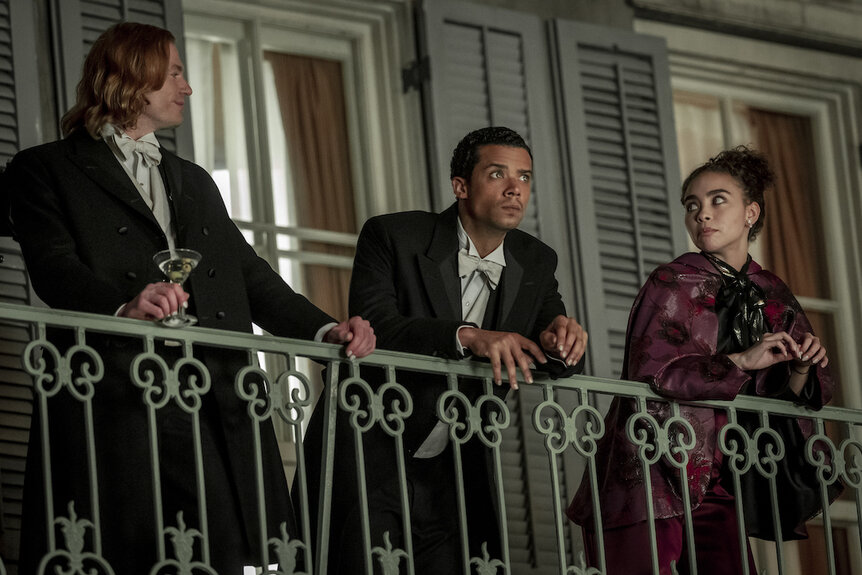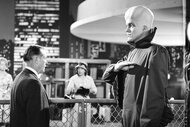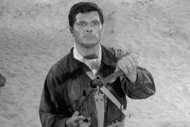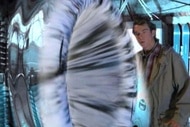Create a free profile to get unlimited access to exclusive videos, sweepstakes, and more!
'Interview with the Vampire' showrunner digs into the deaths & reveals and where Season 2 is heading
Interview with the Vampire showrunner Rolin Jones gives SYFY WIRE an exclusive walk through of the Season 1 finale.
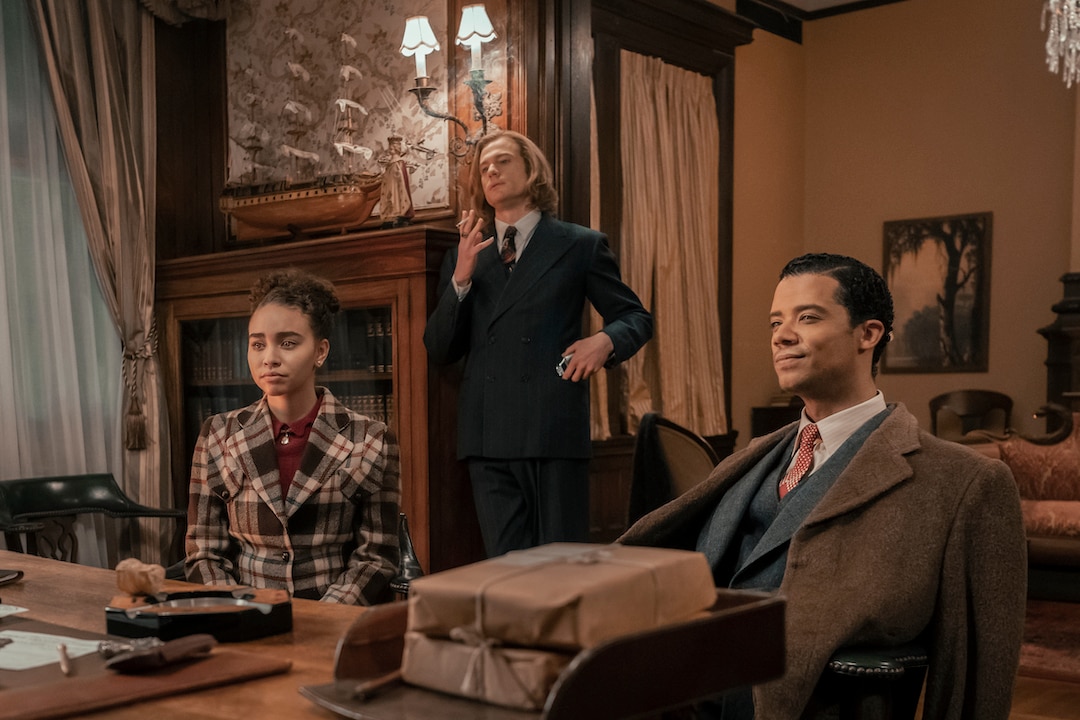
At the start of AMC's series adaptation of Anne Rice's Interview with the Vampire, showrunner Rolin Jones made it clear to fans of Anne Rice's The Vampire Chronicles book series that his series would have some fealty to Rice's first book and her characters, but also broaden the stories of many other characters only alluded to in Rice's text. And, there would also be some remixing of events and plot points to ensure that everyone would have a rewarding, and surprising watch. With the airing of the first season finale, “The Thing Lay Still," on Sunday, Jones certainly made good on his promises.
Throughout Season 1, audiences got to experience the very rich origin stories of infamous Rice vampires Lestat (Sam Reid), Louis (Jacob Anderson), and Claudia (Bailey Bass) that were familiar in theme but sometimes unique in the fine details. Jones and his writers carried that through to the very end of their inaugural season as they remixed the dramatic "demise" of Lestat as more of a murder mystery (with a telepathy twist), and then with the Dubai storyline, gave audiences a big 'ole twist with a character that had been in plain sight all season long.
To get to the bottom of those big decisions and get a taste of what's to come in Season 2 of the series, SYFY WIRE got on a Zoom with Rolin Jones to get the inside scoop on some of the most memorable scenes in “The Thing Lay Still."
***Spoilers below for Season 1 of Anne Rice's Interview with the Vampire***
In the book version of Interview with the Vampire, midway through there is what feels like a natural ending point of a season with the plot by Louis and Claudia to "murder" Lestat. Your season finale aligns with that, but was that always your plan?
Early on, AMC called me and said, "Is there enough story in the first half of the book, and consequently, in the second half of the book to do a full season?" I took about two days to get back to them and said, "We think there is." Once that decision was made, it seemed very clear that that was the slice [point]. The harder thing probably was the slice in Dubai, asking what's the midpoint for the interview itself? And that changed a little bit, but not too much. That was always going to be a reveal. It wasn't necessarily going to be the end of Season 1 reveal, but there was always going to be a reveal.
Smartly, you turned the plot against Lestat into a murder mystery using Claudia's telepathy as an unreliable narrator that allowed for the big surprise about exactly who poisons Lestat. Talk about adding that element into the finale.
For all the things that you're supposed to do to ramp up a finale, we always wanted to end in the significant kill of Lestat, with giant air quotes, packed with a lot of emotion. To get there, you had to make it much more sophisticated. You can't set somebody on fire twice. You needed to say that this is a real obstacle. If this guy [Lestat] has the blood of Akasha, how are we going to do it? It's sort of set up in Episode 6 with that chess match with the Polish immortal. And it's that thing where you have to make Lestat think [the party] is his idea. And then you have to think about if we're gonna set up this party, we're gonna send all these signals about it happening this way. And then you just do the usual potboiler stuff because that was the nature of it. We were just gonna write kind of a thriller and then have about five or six scenes that had the rest of this show in it.
Are there any personal favorite moment in the finale for you?
My favorite scene in there is the balcony scene. It's so screwed up. Lestat is such a weirdo. [Laughs.] But there is such a desperate longing in there. Sam's playing about five things in that scene. But for me, being an adapter who is taking a lot of reverential moves and a lot of wild abandoned moves, to be able to construct a scene where 70 percent of it is Rice's descriptions of New Orleans, you can feel some pride about that. But also that you landed something for actors in a very, very interesting way that usually you don't have time for in a thriller construction.
And it was one of those things that was buried in the edit room because the sound was really bad. We had crazy wind, we had a train and plane [noise]. It wasn't in the first editors cut and then the episode got a little short. The editor, Leo Trombetta, did Episodes 1 and 7. He's a master and knew we had sound issues so he hadn't seen the scene for like three weeks. We played it back and then he got all weepy. So we made a bunch of calls to our sound people at Universal to reconstruct it. Everybody kind of stopped their work and looked at it and we put it back in. That's also one single take that we're using of Sam, with the worst original sound possible.
The whole season was filled with some great black comedy flourishes. Two of my finale favorites were Lestat fake eating the baby and Lestat compelling the guy in the theater to smack himself around. Talk about how they made it into the cut.
We withheld Mardi Gras as long as we could and then we went for it. We're always trying to honor the book in weird ways so we asked can we get him in an 18th-century outfit? And then let him eat cake because King cakes are a big thing, even though historically the King cake doesn't really come around until later. So then I was like, "Build me a cake. Pull out a baby and let him eat it!" [Laughs.]
In the theater, the thing that Sam has had to play as Lestat is withholding his powers, right? And that's a moment to where we hadn't played with telekinesis too much. And there, it just comes out because he is feeling venal and he's beginning to like this idea [of the party]. Then the guy shushes him! [Laughs.] Our writers always talk about side doors and adding little details to scenes. The scene there is to one more step to persuading him, "Don't you think we should do this party?" In addition to that, to make it a fun and iconic, memorable scene, just for that little plot point in a thriller.
Moving to the Dubai storyline, let's talk about your ending reveal that Louis' man servant, Rashid (Assad Zaman) is actually Armand, a major character who plays heavily in the second half of Rice's book. You had to weave that into the whole spine of Season 1 so how did that embedded twist come about?
Every writer who came through the door for Season 1, and God bless every one of them, they had to enter having read the first three books. When you get to the end of the Interview with a Vampire and you start doing the math, you're like, 'Wow, Louis spent a lot of time with the fella." And what gets reduced to like a page and a half, or like two paragraphs in the book, you're now like, "Ah, let's look at that." With our timeline, and with us trying to figure out how to take from books two to 12 and figure out the one of it all, it made perfect timeline sense. We're also talking about unreliable narrator moments where Anne is very, very specific about stuff and then she gets very vague. She laid a map about memory playing a very important part of this. And that there is a very significant relationship [between Louis and Armand] that is out there, too. So, you're bouncing around ideas, and then it all clicks into place. It's a two person play in Season 1 that becomes a three-person play.
Revealing Armand to Molloy and hinting that he also has a past with this vampire that he doesn't remember changes that trio's dynamic a lot going forward now?
Yeah, we have some work to do in Season 2. With Louis, we've already hinted at what's going on there. And that this interviewer has really cracked him. It's hard to put that back up. We have somebody who's coming in to, maybe, patch that up a little bit. And then we have Molloy, who cannot remember what I think was probably a very significant moment in his life. It's three characters that now have to use each other, attack each other and avoid each other to get at something that is underneath and that is unsettled in all three of them. And so that's what makes Dubai very lively.
Last but not least, you tease the Théâtre des Vampires in the diary Molloy is given, which is the Parisian locale in the second half of the book. Are you going to shoot New Orleans for Paris in Season 2?
We're not doing 1950s Paris in New Orleans. I'm in London right now where I did a two-day workshop with a particular London Theatre Company to talk about a particular theatre company in Paris. We're about to send two American vampires into a very European show. We're shooting in Europe.
Season 1 of Interview with the Vampire is available to watch on AMC and AMC+.
Looking for more horror to sink your teeth into? Stream plenty of great scary movies on Peacock. Looking for more vampires? Check out SYFY's new original series Reginald the Vampire.
